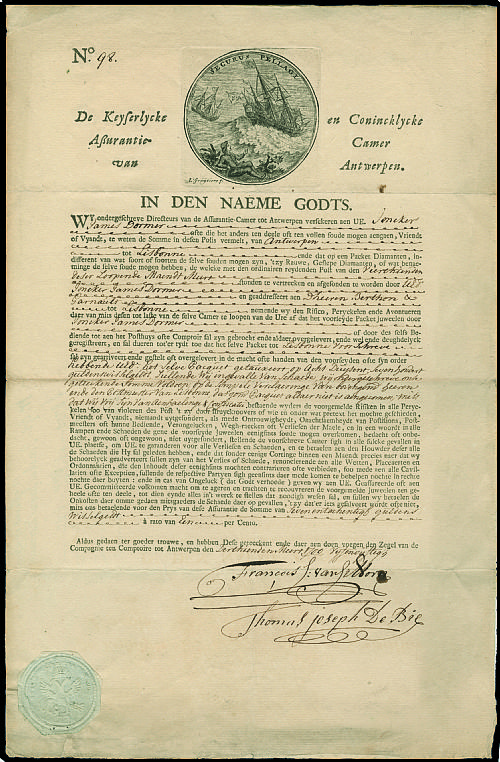
Auction: SW1008 - Bonds and Share Certificates of the World
Lot: 230
De Keyserlycke en Conincklycke Assurantie-Camer van Antwerpen. Insurance Policy, Antwerp, 13. March 1733 Nr. 98. Insurance policy for the transport of diamants from Antwerp to Lisbonne for a value of 8'700 Gilders issued to Josseker James Dormer (1708-1758). He was one of the many merchants from England which at the beginning of the 18th century settled in the booming trading cities of Habsburg Nederlands. First he worked at the Irish trading house “Prosser & Porter” in Bruges. 1732 he left aboard one of the two “permission-vessels" of the Ostend Company to Canton. In 1734 he opened a merchant business in Antwerp and expanded his business through an extensive network of correspondents and trade relation across Europe. In middle of the century he created the Antwerp-Insurance Company. VF. In the year 1781, Empress Maria Theresia established the last East-India trading Company for the Austrian Empire. The main initiator was William Bolts (1739–1808), a trader and adventurer, who began his career as an employee for the English East India Company but was then forced to leave. He then became an independent merchant and in 1775, he offered his services to the Imperial government, putting forward a proposal for establishing Austrian trade with East India from the Adriatic port of Trieste by taking advantage of the ongoing Revolutionary War between Britain, France and Holland (1775-1783) to take over a share of these countries’ trade. 1776 the Empress granted Bolts a ten-year charter authorizing him to trade under Imperial colours from Austria’s Adriatic ports with Persia, India, China and Africa. As his enterprise required substantial capital, Bolts formed a partnership with the Antwerp banker, Charles Proli (1723-1786), his father was a director of the Keyserlich Indische Compagnie , and founded “La Société du Commerce d’Asie & d’Afrique de Trieste et Anvers”, which was based in two major Austrian harbors: Ostend and Trieste. In August 1871, the Company was opened to public subscription to raise 1000 shares at 1’000 Florins each. One thousand additional shares were issued to Proli and Bolts for the assets of the former association. Bolts then ceded his charter to the Company. After a dispute with his partner, Bolts soon gave his share in the Company to his partner in return for a loan and the right to send two ships on his own account to China. Between 1781 and 1783, the ongoing war caused the price of tea in Europe, notably in England, to rise to unprecedented levels. As a result Proli focused the Company completely on tea trade with China. However, the signing of an armistice in January 1783 and the British reducing tax on tea from fifty percent to ten percent made smuggling from the Netherlands unprofitable. This caused the price of tea in Europe to collapse. In January 1785, the Company had to suspend all payments and was soon declared bankrupt, bringing the Proli banking house down with it. Charles Proli committed suicide.
Estimate
SFr800 to SFr1,000




